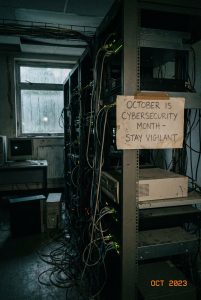May 26, 2025
Shadow IT: The Hidden Cybersecurity Risk Lurking in Your Office
Your employees might be your business's biggest cybersecurity risk—and not just because they're prone to clicking phishing emails or reusing passwords. It's because they're using apps your IT team doesn't even know about.
This is called Shadow IT, and it's one of the fastest-growing security threats facing businesses today.
💻 What Is Shadow IT?
Shadow IT refers to any technology—apps, software, or cloud services—used in your organization without approval from your IT department.
Common examples include:
-
Employees using personal Google Drive or Dropbox accounts to share work files
-
Teams adopting tools like Trello, Slack, or Asana without IT oversight
-
Installing WhatsApp, Telegram, or other messaging apps on company devices
-
Marketing staff using AI tools or automation platforms with no security review
It might seem harmless—or even helpful—but it's creating serious security vulnerabilities behind the scenes.
🚨 Why Is Shadow IT So Dangerous?
Because IT has no visibility or control, these unauthorized tools become security blind spots. That opens the door to:
🛑 Unsecured Data Sharing
Sensitive documents stored in personal accounts or sent over consumer apps can be intercepted, leaked, or stolen.
⚠️ Lack of Security Patching
Authorized software is regularly updated to patch vulnerabilities. Shadow apps? Not so much.
📉 Compliance Violations
Regulations like HIPAA, GDPR, or PCI-DSS require strict data control. Shadow IT use could lead to major fines and legal trouble.
🎯 Higher Risk of Malware or Phishing
Employees might unknowingly download malicious apps disguised as legitimate tools—opening your network to malware, ad fraud, or ransomware.
🔓 Account Hijacking
Many unauthorized tools lack multifactor authentication (MFA), making it easy for hackers to compromise employee credentials.
👀 Real-World Example: The "Vapor" App Scandal
In March, IAS Threat Labs uncovered over 300 malicious apps on the Google Play Store—downloaded more than 60 million times.
These apps pretended to be health trackers or utilities, but once installed:
-
They phished for credit cards and login credentials
-
They hid their app icons
-
They flooded devices with intrusive full-screen ads
-
Some rendered phones unusable
This shows just how easily unauthorized apps can infiltrate your business—without anyone noticing.
🧠 Why Employees Use Shadow IT
Most employees don't mean harm. They just want to get their job done faster. But they may:
-
Find company tools frustrating or slow
-
Want modern, mobile-friendly alternatives
-
Not realize the security risk
-
Think IT approval takes too long
It's often innocent—but the consequences of a breach are not.
🔐 How to Stop Shadow IT Before It Hurts Your Business
✅ 1. Create an Approved Software List
Work with your IT team to clearly define what tools are approved—and keep it updated.
✅ 2. Restrict App Downloads on Company Devices
Set policies that prevent software installs without IT review.
✅ 3. Train Employees on the Risks
Educate your team: Shadow IT isn't just a shortcut—it's a security threat.
✅ 4. Monitor Network Traffic
Use network-monitoring tools to detect unauthorized app activity.
✅ 5. Strengthen Endpoint Security
Deploy EDR (endpoint detection & response) solutions that flag and stop suspicious software behavior in real-time.
🚫 Don't Let Shadow IT Become a Breach You Never Saw Coming
You can't protect what you can't see.
Shadow IT is sneaky, fast-growing, and often overlooked—until a breach, compliance failure, or ransomware attack strikes.
🎯 Want to Know What Unauthorized Apps Are Running in Your Business?
Let's find out.
Book a FREE 10-minute Discovery Call with our team. We'll discuss your current environment, identify Shadow IT risks, and help you create a strategy to lock it all down—before it becomes a nightmare.



